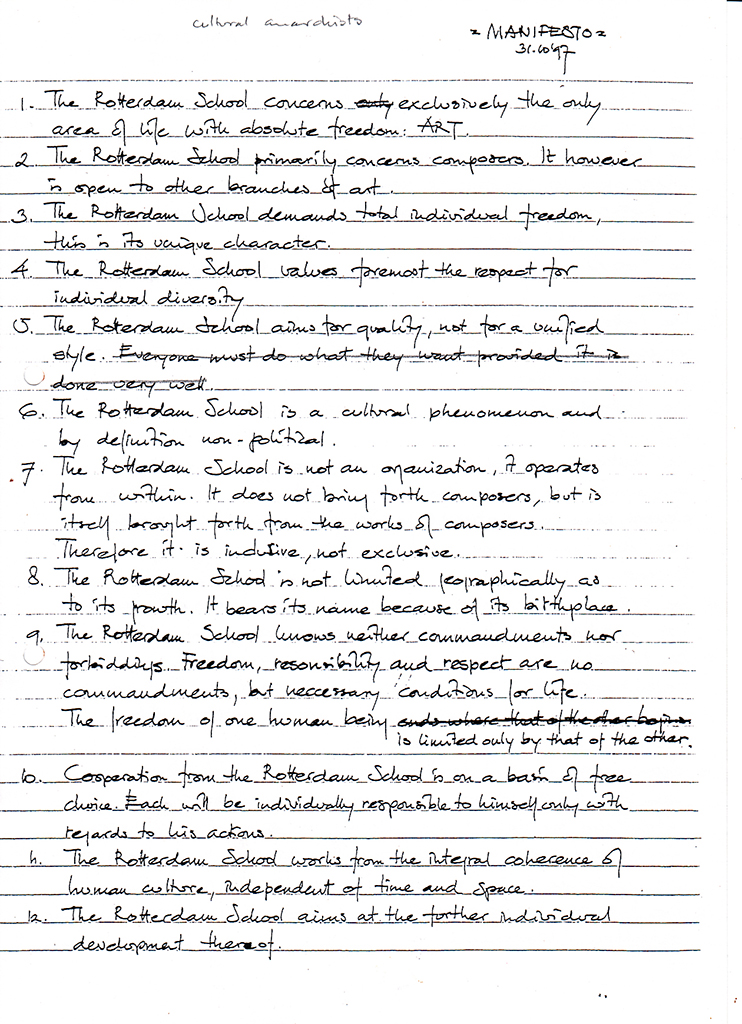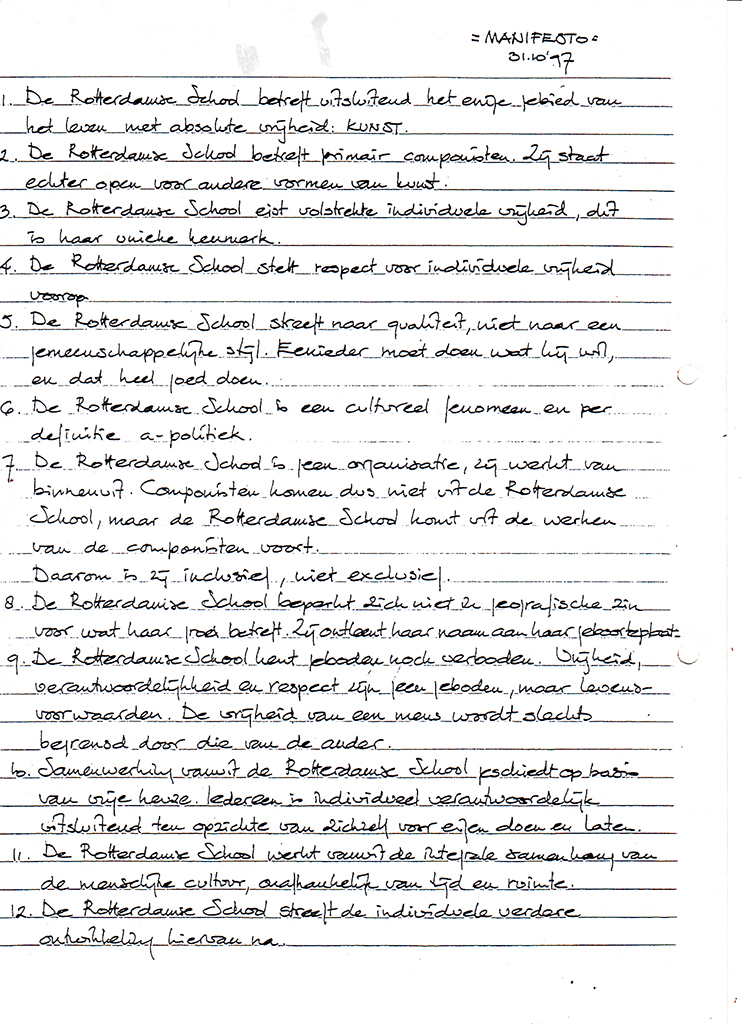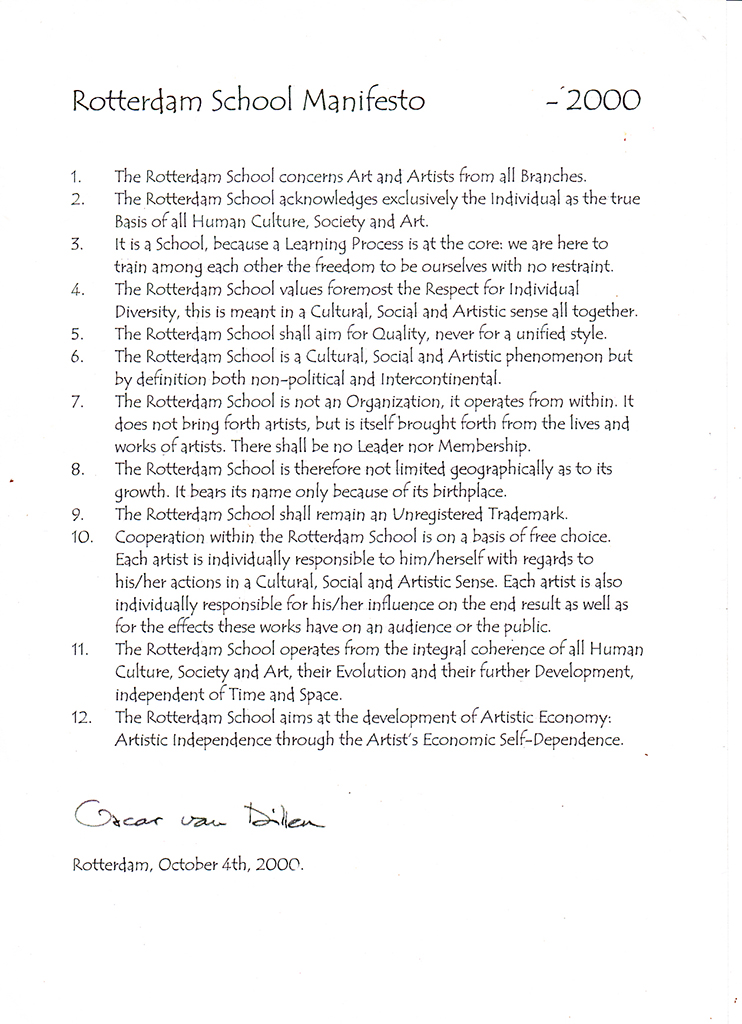 Introduction
Introduction
The Rotterdam School Manifesto is a historical document concerning the Rotterdam School of composers1. It was written by Oscar van Dillen on 31 October 1997 and consequently discussed (and slightly amended as a result) by the Rotterdam School2 composers. This amended form is given below in English, whereas the Dutch text remained unchanged, as all joint discussions in 1997 took place in English.
In the course of “De Uitweiding”, his series of lectures on art, eventually 4 October 2000 a fully revised and updated version was published by Oscar van Dillen on the Internet for the first time, on a domain no longer existing today3.
Manifesto 1997 (English text)
- The Rotterdam School concerns exclusively the only area of life with absolute freedom: ART.
- The Rotterdam School primarily concerns composers. It however is open to other branches of art.
- The Rotterdam School demands total individual freedom, this is its unique character.
- The Rotterdam School values foremost the respect for individual diversity.
- The Rotterdam School aims for quality, not for a unified style.4
- The Rotterdam School is a cultural phenomenon and by definition non-political.
- The Rotterdam School is not an organization, it operates from within. It does not bring forth composers, but is itself brought forth from the works of composers. Therefore is is inclusive, not exclusive.
- The Rotterdam School is not limited geographically as to its growth. It bears its name because of its birthplace.
- The Rotterdam School knows neither commandments nor forbiddings. Freedom, responsibility and respect are no commandments, but neccessary conditions for life. The freedom of one human being is limited only by that of the other.5
- Cooperation from the Rotterdam School is on a basis of free choice. Each will be individually responsible to himself only with regards to his actions.
- The Rotterdam School works from the integral coherence of human culture, independent of time and space.
- The Rotterdam School aims at the further individual development thereof.
Manifesto 1997 (Nederlandse tekst)
- De Rotterdamse School betreft uitsluitend het enige gebied van het leven met absolute vrijheid: KUNST.
- De Rotterdamse School betreft primair componisten. Zij staat echter open voor andere vormen van kunst.
- De Rotterdamse School eist volstrekte individuele vrijheid, dit is haar unieke kenmerk.
- De Rotterdamse School stelt respect voor individuele vrijheid voorop.
- De Rotterdamse School streeft naar qualiteit6, niet naar een gemeenschappelijke stijl.7
- De Rotterdamse School is een cultureel fenomeen en per definitie a-politiek.
- De Rotterdamse School is geen organisatie, zij werkt van binnenuit. Componisten komen dus niet uit de Rotterdamse School, maar de Rotterdamse School komt uit de werken van de componisten voort. Daarom is zij inclusief, niet exclusief.
- De Rotterdamse School beperkt zich niet in geografische zin voor wat haar groei betreft. Zij ontleent haar naam aan haar geboorteplaats.
- De Rotterdamse School kent geboden noch verboden. Vrijheid, verantwoordelijkheid en respect zijn geen geboden, maar levensvoorwaarden. De vrijheid van een mens wordt slechts begrensd door die van de ander.8
- Samenwerking vanuit de Rotterdamse School geschiedt op basis van vrije keuze. Iedereen is individueel verantwoordelijk uitsluitend ten opzichte van zichzelf en zijn eigen doen en laten.
- De Rotterdamse School werkt vanuit de integrale samenhang van de menselijke cultuur, onafhankelijk van tijd en ruimte.
- De Rotterdamse School streeft de individuele verdere ontwikkeling hiervan na.
Manifesto 2000 (English only)
- The Rotterdam School concerns Art and Artists from all Branches.
- The Rotterdam School acknowledges exclusively the Individual as the true Basis of all Human Culture, Society and Art.
- It is a School, because a Learning Process is at the core: we are here to train among each other the freedom to be ourselves with no restraint.
- The Rotterdam School values foremost the Respect for Individual Diversity, this is meant in Cultural, Social and Artistic sense all together.
- The Rotterdam School shall aim for Quality, never for a unified style.
- The Rotterdam School is a Cultural, Social and Artistic phenomenon but by definition both non-political and Intercontinental.
- The Rotterdam School is not an Organization, it operates from within. It does not bring forth artists, but is itself brought forth from the lives and works of artists. There shall be no leader nor membership.
- The Rotterdam School is therefore not limited geographically as to its growth. It bears its name only because of its birthplace.
- The Rotterdam School shall remain an Unregistered Trademark.
- Cooperation within the Rotterdam School is on a basis of free choice. Each artist is individually responsible to him/herself with regards to his/her actions in a Cultural, Social and Artistic Sense. Each artist is also individually responsible for his/her influence on the end result as well as for the effects these works have on an audience or the public.
- The Rotterdam School operates from the integral coherence of all Human Culture, Society and Art, their Evolution and their further Development, independent of Time and Space.
- The Rotterdam School aims at the development of Artistic Economy: Artistic Independence through the Artist’s Economic Self-Dependence.
Manuscript 1997
Original 1997 manuscript by Oscar van Dillen, with amendments in English only:

Typescript 2000
Original 2000 typescript by Oscar van Dillen, in English only:
Footnotes
- see also Edward Top’s website, which includes his 1998 caricature of the Rotterdam School versus the Seven-headed Dragon of Tradition ↩
- Rotterdam School on Wikipedia ↩
- at coij.demon.nl, the subdomain’s name coij referring to composer oscar ignatius joannes: this domain’s existence in 2001 has been registered by the Wayback Machine, but not its 2000 contents ↩
- amendment:
Everyone must do what they want provided it is done very well↩ - amendment:
ends where that of the other begins↩ - sic, deze oude spelling staat in het originele handschrift ↩
- de engelstalige amendementen zijn niet overgenomen in de nederlandse tekst, omdat de gezamenlijke besprekingen die hiertoe leidden in het engels plaatsvonden, vandaar dat de tekst verder gaat met: “Eenieder moet doen wat hij wil, en dat heel goed doen.” ↩
- de engelstalige amendementen zijn niet overgenomen in de nederlandse tekst, omdat de gezamenlijke besprekingen die hiertoe leidden in het engels plaatsvonden, en deze oorspronkelijke zinsnede is daarom ongeamendeerd gebleven. ↩
